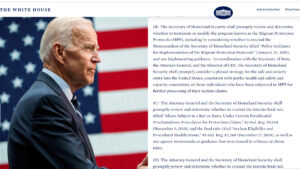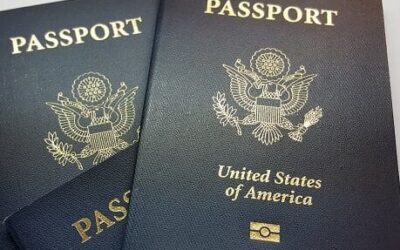 President Joe Biden’s proposed U.S. Citizenship Act takes aim at reforming the immigration system by focusing on certain priorities. If approved, the Act would provide a pathway to citizenship, strengthen labor protections, prioritize the use of technology to control borders, and address the root causes of migration from Central America, according to a White House statement.
President Joe Biden’s proposed U.S. Citizenship Act takes aim at reforming the immigration system by focusing on certain priorities. If approved, the Act would provide a pathway to citizenship, strengthen labor protections, prioritize the use of technology to control borders, and address the root causes of migration from Central America, according to a White House statement.
As proposed, the U.S. Citizenship Act would:
Create a roadmap to citizenship for undocumented individuals. Undocumented individuals can apply for temporary legal status and green cards after five years, if they pay their taxes and pass criminal and national security background checks. Dreamers, TPS holders and immigrant farmworkers, who meet specific requirements, are eligible for green cards immediately. After three years, all green card holders, who pass background checks and demonstrate knowledge of English and U.S. civics, can apply to become citizens.
Keep families together. The bill will eliminate provisions that keep families apart, such as the 3- and 10-year bars, which prevent individual’s legal admission into the United States for 3 or 10 years after they have been living in the United States unlawfully and are deported or leave. The bill will recognize permanent partnerships and eliminate discrimination of LGBTQ+ families, while providing protections for orphans, widows, children, and Filipino veterans who fought alongside the United States in World War II. Immigrants with approved family-sponsorship petitions can join family in the United States temporarily while they wait for green cards to become available.
Embrace diversity. The bill includes the NO BAN Act that prohibits discrimination based on religion and limits presidential authority to issue future bans. The bill also increases Diversity Visas from 55,000 to 80,000.
Promote immigrant and refugee integration and citizenship. New funding will go to state and local governments, private organizations, educational institutions, community-based organizations, and not-for-profit organizations to expand programs that promote integration and inclusion, increase English-language instruction, and provide assistance to becoming citizens.
Grow our economy. This bill clears employment-based visa backlogs, captures unused visas, reduces wait times, and eliminates per-country visa caps. Graduates of U.S. universities with advanced STEM degrees will find it easier to stay in the United States. The bill will improve access to green cards for workers in lower-wage sectors and eliminate other hurdles for employment-based green cards. Dependents of H-1B visa holders will receive work authorization, and children are prevented from “aging out” of the system.
Protect workers from exploitation and improve the employment verification process. DHS and the Department of Labor will establish a commission involving labor, employer, and civil rights organizations to make recommendations for improving the employment verification process. Workers who suffer serious labor violations and cooperate with worker protection agencies will be granted greater access to U visa relief. The bill protects workers who are victims of workplace retaliation from deportation in order to allow labor agencies to interview these workers. It also protects migrant and seasonal workers, and increases penalties for employers who violate labor laws.
Supplement existing border resources with technology and infrastructure. Technology will be used to expedite screening and enhance the ability to identify narcotics and other contraband at every land, air, and sea port of entry. Infrastructure will be improved at ports of entry to enhance the ability to process asylum seekers and detect, interdict, disrupt and prevent narcotics from entering the United States. The DHS Secretary will develop and implement a strategy to manage and secure the southern border between ports of entry that focuses on flexible solutions and technologies that expand the ability to detect illicit activity, evaluate the effectiveness of border security operations, and be easily relocated by the Border Patrol.
Manage the border and protect border communities. Funding for training and continuing education will promote agent and officer safety and professionalism. The bill will create a Border Community Stakeholder Advisory Committee, provide more agents to investigate criminal and administrative misconduct, and require the issuance of policies governing the use of force. The Government Accountability Office will study the impact of DHS’s authority to waive environmental and state and federal laws to build barriers and roads near U.S. borders. Additional rescue beacons to prevent deaths along the border will be provided. The bill authorizes and provides funding to develop guidelines and protocols for the care of individuals, families, and children in Border Patrol custody.
Crack down on criminal organizations. The bill enhances the prosecution of smugglers and traffickers, who are responsible for the exploitation of migrants. It expands investigations, intelligence collection and analysis pursuant to the Foreign Narcotics Kingpin Designation Act to increase sanctions against foreign narcotics traffickers, their organizations and networks. It requires the Federal Bureau of Investigation, Drug Enforcement Agency and DHS, in coordination with the Secretary of State, to improve and expand transnational anti-gang task forces in Central America.
Start from the source. The President’s $4 billion, four-year inter-agency plan will address the underlying causes of migration, including greater assistance to El Salvador, Guatemala, and Honduras, if they reduce the corruption, violence, and poverty that causes people to flee their home countries. It creates safe and legal channels for people to seek protection, such as new Designated Processing Centers throughout Central America to register and process displaced persons for refugee resettlement and other lawful migration avenues — either to the United States or other partner countries. The bill re-institutes the Central American Minors program to reunite children with U.S. relatives and creates a Central American Family Reunification Parole Program to more quickly unite families with approved family sponsorship petitions.
Improve the immigration courts and protect vulnerable individuals. The bill expands family case management programs, reduces immigration court backlogs, expands training for immigration judges, and improves technology for immigration courts. Funding is authorized for legal orientation programs and counsel for children, vulnerable individuals, and others. The bill also provides funding for school districts educating unaccompanied children.
Support asylum seekers and other vulnerable populations. The bill eliminates the one-year deadline for filing asylum claims and aims to reduce asylum application backlogs. Protection will be increased for U visa, T visa, and VAWA applicants. The cap on U visas will be raised from 10,000 to 30,000. The bill also expands protections for foreign nationals assisting U.S. troops.
Connect with us:
Website: https://newamericansmedia.com/
YouTube: https://www.youtube.com/c/NewAmericansMedia
Facebook: https://www.facebook.com/New-Americans-Media
Twitter: https://twitter.com/NewComersMedia
Instagram: https://www.instagram.com/NewAmericansMedia/



0 Comments
Trackbacks/Pingbacks